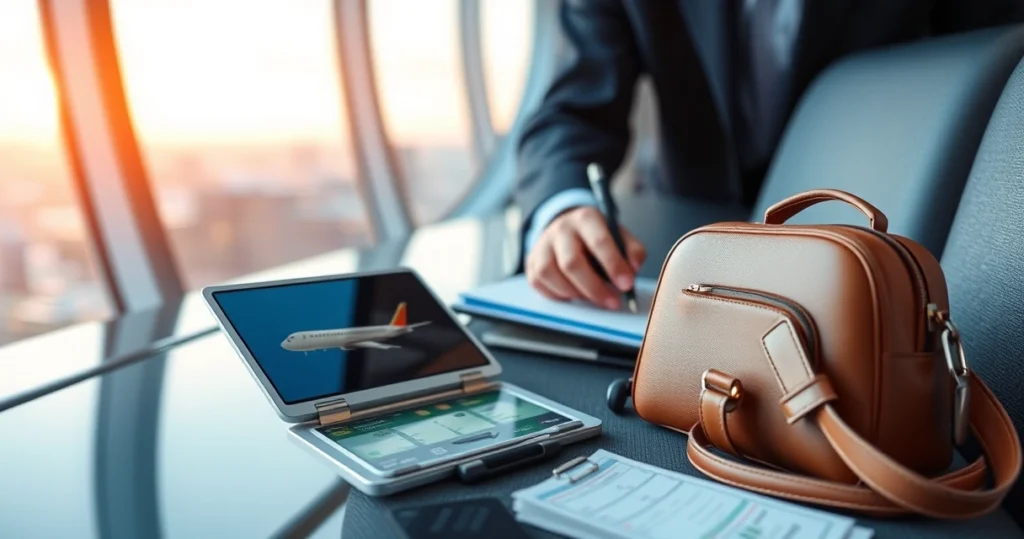Navigating the Future of Business Travel: Perks and Pitfalls Uncovered
In the ever-evolving landscape of business travel, professionals are presented with a myriad of options and challenges that can significantly impact their experience. With advancements in technology, the modern business trip is not just about reaching a destination; it encompasses everything from the convenience of expense management to the comfort of travel perks. As remote working becomes more prevalent, the way we commute for business is also changing, making it essential to stay informed about the available options and potential pitfalls.

This article delves into the intricacies of contemporary business travel, highlighting the perks that enhance the journey while also shedding light on the pitfalls that can derail even the best-laid plans. Whether you’re a frequent flyer or an occasional traveler, understanding these aspects can help you navigate the complexities of business travel more effectively.
The Evolution of Business Travel
Business travel has undergone a transformation over the years, adapting to the needs of both companies and employees. With the rise of remote work, there is a growing emphasis on flexibility and efficiency. Companies are increasingly recognizing the importance of face-to-face meetings, networking events, and conferences, leading to an uptick in business travel. However, this shift brings both advantages and challenges.
Embracing Technology in Business Travel
Modern technology plays a pivotal role in shaping the business travel experience. From mobile apps that streamline booking processes to AI-driven platforms that assist in managing travel itineraries, technology is making travel more efficient. Additionally, companies are now leveraging expense management software to simplify the often tedious task of expense reporting.
- Mobile Apps: Applications like TripIt and Expensify allow travelers to organize their itineraries and manage expenses with ease.
- Virtual Reality: Some companies are exploring VR technology for virtual meetings, potentially reducing the need for travel.
- AI Assistance: AI tools can predict travel costs and suggest budget-friendly options.
Travel Perks: Enhancing the Business Trip Experience
Travel perks can significantly enhance the quality of a business trip, making it not only more enjoyable but also more productive. Many companies are recognizing the value of investing in these perks to ensure employee satisfaction and efficiency.
Comfort and Convenience
One of the most tangible perks of modern business travel is the availability of upgraded travel options. From first-class flights to premium hotel accommodations, these enhancements can greatly improve the travel experience.
- Priority Boarding: This allows travelers to secure overhead bin space and settle in comfortably before the flight.
- Lounge Access: Airport lounges provide a quiet space to work or relax, often equipped with Wi-Fi and refreshments.
- Flexible Booking Options: Companies that offer flexible travel policies give employees the freedom to choose travel times that suit them best.
Networking Opportunities
Business trips often provide unique opportunities for networking that can lead to valuable business connections. Conferences, seminars, and workshops are not only platforms for learning but also excellent venues for meeting industry peers.
Modern Commuting: Redefining Business Travel
The rise of remote work has prompted a rethink of traditional commuting patterns. Many professionals now find themselves balancing in-person meetings with remote work, which has led to the popularity of multiday commutes. This approach allows for a more flexible schedule, but it also requires careful planning to avoid burnout.
Multiday Commuting
Multiday commuting involves spending several days in a city for a series of meetings or events, rather than making a quick trip. This can provide several advantages:
- Increased Productivity: Spending more time in one location allows for deeper engagement with clients or colleagues.
- Cost-Effectiveness: Often, longer stays can reduce per-trip costs related to flights and accommodations.
- Work-Life Balance: Combining business trips with personal time can enhance overall job satisfaction.
Travel Pitfalls: What to Avoid
While the perks of business travel can be appealing, there are pitfalls that can undermine the experience. Awareness of these issues can help travelers mitigate risks and plan more effectively.
Expense Report Challenges
Expense reports are notorious for being time-consuming and complex. Many travelers dread the process of documenting their expenses, which can lead to frustration and even inaccuracies in reporting.
- Lack of Clarity in Policies: Confusing travel policies can lead to misunderstandings about what is reimbursable.
- Time-Consuming Documentation: Collecting receipts and filling out reports can take valuable time away from work.
- Potential for Errors: Mistakes in expense reports can lead to delays in reimbursement and complications with accounting.
Health and Safety Concerns
Traveling for business can expose individuals to various health and safety risks. Navigating these concerns is crucial for ensuring a safe journey.
- Travel Restrictions: Sudden changes in travel restrictions can disrupt plans and cause stress.
- Health Risks: Crowded airports and public transport can increase the risk of illness.
- Emergency Situations: Being unprepared for emergencies can exacerbate stress during travel.
FAQs About Business Travel
1. What should I include in my expense report for a business trip?
Include all receipts for travel-related expenses such as flights, accommodations, meals, transportation, and any other business-related costs incurred during the trip.
2. How can I make my business travel more efficient?
Utilize travel apps for organizing your itinerary, book your travel in advance, and familiarize yourself with your company’s travel policy to avoid confusion.
3. What are the most common travel perks offered by companies?
Common travel perks include priority boarding, lounge access, flexible travel options, and coverage for meals and accommodations.
4. How can I manage health risks while traveling for business?
Stay updated on travel advisories, practice good hygiene, and keep a health kit with essentials like hand sanitizer and masks.
5. What should I do if I encounter issues with my expense report?
If you experience issues, contact your finance or HR department for clarification on policies and assistance in resolving discrepancies.
Conclusion
Navigating the future of business travel requires a keen understanding of both the perks and pitfalls associated with the modern commuting landscape. By embracing technology, leveraging travel perks, and remaining cognizant of potential challenges, professionals can enhance their travel experiences while minimizing stress. As the dynamics of business travel continue to evolve, staying informed and adaptable will be key to successfully managing your business trips.
📰 Original Source
Este artigo foi baseado em informações de: https://www.wired.com/new-era-business-travel/



